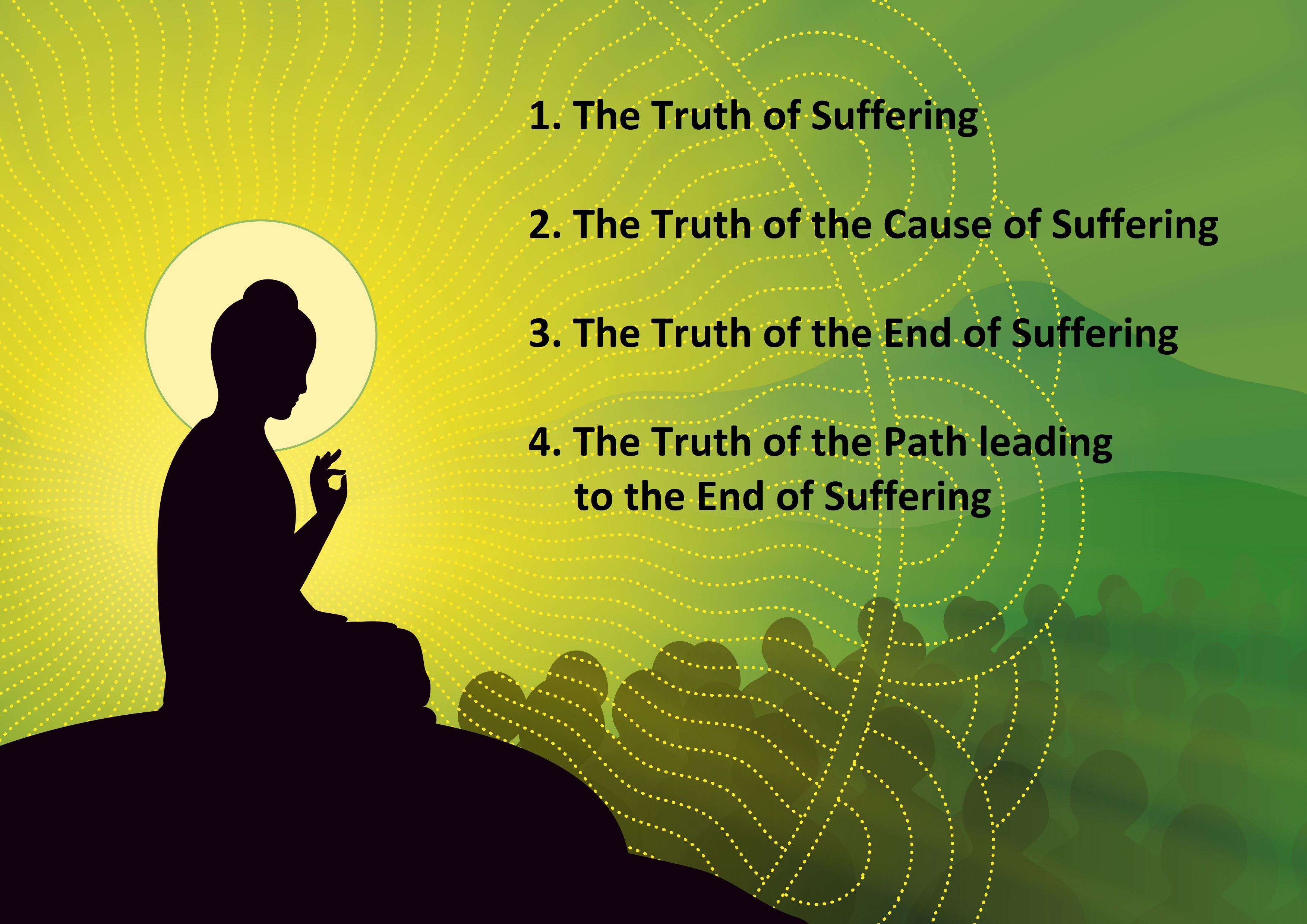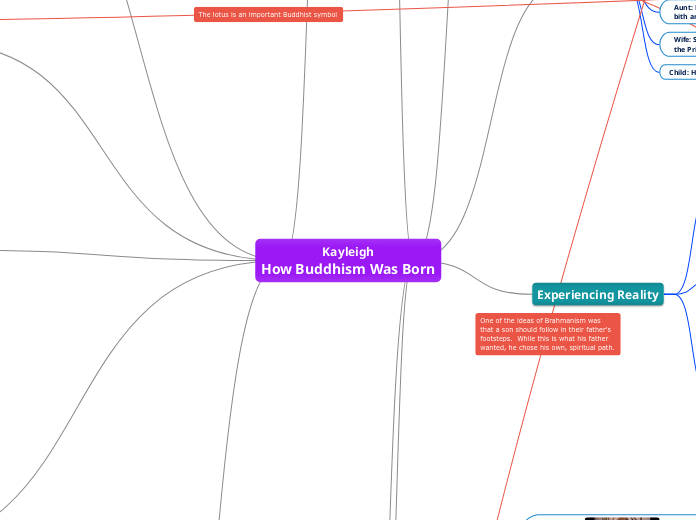Kayleigh
How Buddhism Was Born
Buddhism Today
It is one of the first world religions with a following of well over 400 million people
Buddhist techniques such as meditation have been adopted by the western world (lay people) as practices of self improvement
Archeologists continue to discover important landmarks of early Buddhism such as King Ashoka's pillars
When the British colonized India, Buddhism was already a dying religion, from Hinduism and invading Muslims but it continues to endure, especially with archeological development
Prophesy
At his birth, he fas found to have the 32 marks indicating he would either be a great emperor or a great spiritual leader
Family
Father: Suddhodana, elected chieftain of the Shakya tribe
Mother: Maya, Queen. She had a prophetic dream about the coming of the Buddha, in which 4 deities carried her to the Himalayas
Aunt: His mother died of illness shortly after his bith and so he was brought up by his aunt
Wife: Siddhartha was married at the age of 16 to the Princess Yasodhara
Child: He had one son with Yasodhara, Rāhula
Experiencing Reality
Siddhartha had a curiosity for the world that lay beyond the palace walls. Though his father wanted to keep him, he eventually decided to let the young prince venture. First, he cleared the city his son would be walking from the sick and impoverished to create a false image of the world that lay beyond his guarded life.
At the time he chose to go beyond the palace walls, a plowing/harvest festival was also occuring. At this event he noticed a man pulling a plow through the dirt enduring great suffering.
Contemplating this, he sat and thought of the great suffering that all beings must endure. The people pulling the plows, the worms in the dirt; he realized that everything was connected to everything else and that every action has consequences. This was the first great turning point in young Siddhartha's life.
Discovered Karma: concept of the effects and consequences of life
Entered into a jhana: trance; first step to enlightenment
Four Journeys
First, he noticed old man making his way through the village. Upon asking his guide, he discovered aging and that everyone will go through it eventually, even himself.
On his second journey, he came across a sick and diseased man. Again, Channa, his guide told him that sickness could befall anyone.
The next thing that he saw on his journeys was a man being carried away to the funeral pyre. It was then he realized that life was finite. everyone would suffer, die and be reborn to repeat the process.
Reincarnation: He discovered the Brahman belief that each person lives, suffers and dies to be born again. This cycle of suffering inspired him and led him to continue questioning the world and himself.
Lastly, he saw a man on the street who had given up the comforts of daily life. He sat in simple robes with a begging bowl. Channa explained that he did this so he could confront reality and search for answers pertaining to the painfulness of existance
Brahmanism

Now known as Hinduism, this was the prominent religion of Siddhartha's time in India. In order to make the progress he wanted, he needed to challenge it.
They followed the Vedas, which contained sacred knowledge
Other people were also confronting the religion at the time. It was described as a "jungle of views".
The Spread of Buddhism
A fre hundred years after the death of the Buddha, a council assembled to record his teaching and they were handed down for centuries by monks
King Ashoka converted India to Buddhism. He elped monks send missions to countries surrounding India, such as Sri Lanka
Key Beliefs Discovered

The Buddha discovered the four Nobel Truths, which were foundational beliefs for the religion; 1. Recognize suffering in life
2. Diagnose the cause of suffering, desire
3. The cure
4. How to cure and achieve nirvana
Morality, meditation, and wisdom are the stepping stones to enlightenment
He dedicated the next 40 years of his life to helping people acchieve enlightenment
Practice & mindfulness
No killing, stealing, sexual misconduct, lying, intoxication
The Demon Mara
He sat with his thoughts and entered an altered state of consciousness in which he was able to encounter Mara within his mind
He attacked Siddhartha with a barrage of arrows but he turned them into lotus flowers
Mara also tried to seduce him with his three daughters but he resisted and did not indulge and so they rotted away before him
In recognizing that Mara was something that existed within him, that existed within everyone in the deepest parts of themselves, he achieved enlightenment
After 7 days beneath the bodhi tree he achieved nirvana and became the Buddha
Another Revelation
He came across a musician tuning his instrument. Tuning it too much would snap the strings but too little and it would not sound right. This inspired a thought within him.
Siddhartha realized that he needed to find the middle ground. Balance: not ignoring nor mastering body; just acknowledging it.
At Bodh Gaya, now a religious pilgrimage site, he sat beneath a bodhi tree and vowed not to leave until he achieved enlightenment
Searching for Answers

Siddhartha focused on meditation and found two key types; ones that focused on breathing and ones that centered on physical discomfort
In discovering these techniques, he sought teachers, gurus who were familiar with the practice. He also acquired 5 followers which impressed his gurus extensivley.

He turned to Asceticism, an extreme approach focused on letting go of indulgences, including food. Nearly starving himself to death, he was saved by a young girl who gave him rice and milk. Through this he realized that he would not find answers following these extremes, and dying would accomplish nothing.
Ending 6 years of asceticism, his followers abandoned him, thinking that he had grown weak by losing his self-restraint
Deciding to Leave
In seeking answers to his questions, he left his family and set off on his own.
A mist put the guards to sleep as he escaped with Channa, though he told him to return to the palace with his robes and jewelry once he reached the River Anoma, where he also cut his hair.
He arrived in the city and experienced greater suffering than he had ever witnessed before
